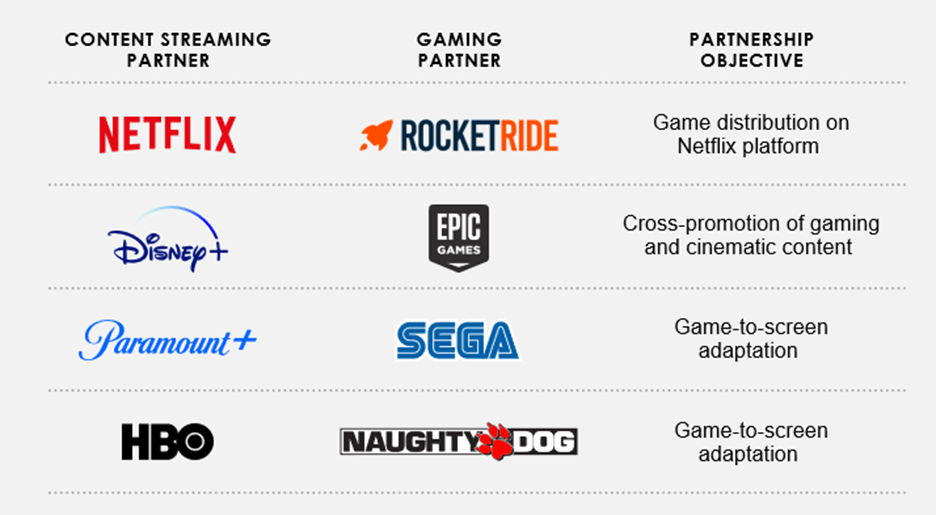
For today’s consumers, watching an episode or two of a streaming series isn’t enough to satisfy their entertainment needs. Consumers want to share their experiences on social media, download the show’s playlist, play the video game, and even engage in interactive content to influence the outcomes of the episodes they watch.
This need for immersive experiences is prompting entertainment providers to evolve to gain consumers’ attention and keep them from going elsewhere. Movie studios are turning to gaming companies for more interactive experiences, while gaming looks to movies for cinematic effects. And streaming services are experimenting with new partnerships and emerging technologies to speed innovation and give their subscribers immersive entertainment.
The content streaming industry has traditionally been separated between cinematic, gaming, and social media. Now they’re all colliding as consumers want to do more with their content. That’s why strategic partnerships are more important than ever.
The entertainment industry—particularly streaming media—is evolving. Providing immersive environments and interactive entertainment will be key to survival. And partnerships are the most effective way forward.
How Streaming Services Are Partnering to Get Ahead

Netflix (Game Development and Launch)
As Netflix attempts to reposition and gain market share after losing subscription memberships, the video streaming service has partnered with Canadian games agency RocketRide Games to expand its video games library. In December 2021, RocketRide Games delivered two titles—“Dominoes” and “Knittens”—with more on the way in the coming months. As an incentive to players, Netflix promised no ads, no in-app purchases and all games included with Netflix subscriptions.
By partnering with RocketRide Games, Netflix takes advantage of its partner’s in-house production experts, who offer an extensive range of optional support services, including ideation, creative direction, executive production, market analysis, product management and business strategy—all the way through to launch planning and engagement analysis.
For its part, RocketRide Games brings its games to millions of Netflix subscribers that have already shown interest for mobile entertainment. Netflix announced in its 2021 Q4 earnings call that it has a “growing number” of both daily active and monthly active users on its gaming titles.
Note: In November 2021, Netflix also launched five other games developed previously by its game developer partner, including “Stranger Things: 1984” (BonusXP), “Stranger Things 3: The Game” (BonusXP), “Shooting Hoops” (Frosty Pop), “Card Blast” (Amuzo & Rogue Games) and “Teeter (Up)” (Frosty Pop). Netflix did not specify which games are major contributors to its increasing subscriber base.
Disney+ (Streaming Media Cross-Promotion)
In December 2020, Disney+ partnered with Epic Games, the developer of “Fortnite,” to provide a free, two-month streaming service for “Fortnite” players age 18+ who make real-money purchases in-game. The latest season of “Fortnite” brings the “Lore, Legends, Heroes and Villains from Marvel”—including Iron Man and Groot—to Epic’s popular game.
The partnership gives Disney the ability to cross-promote its streaming media services to the 350 million Marvel and Star Wars fans on “Fortnite.” Epic Games could extend the entertainment experience by offering premium streaming content on Disney+ for “Fortnite” players who are also fans of Disney intellectual properties, including Marvel and “The Mandalorian.”
Paramount+ (Game-to-Screen Adaptation)
In February 2022, Paramount Pictures and Sega Corporation announced they’ve started development on a third feature film installment to the Sonic the Hedgehog franchise. Additionally, Sega and Paramount+ are developing the first, original live-action Sonic series, to launch in 2023. The Paramount+ series will feature the character Knuckles, voiced by Idris Elba.
“Sonic the Hedgehog” is a Japanese video game that reached a total of 1.38 billion downloads by 2021. The first feature film of the video game, released in 2020, produced nearly $320 million in worldwide box office earnings. Paramount aims to continue monetizing on Sega’s loyal fanbase.
Through this partnership, Sega Corporation can further scale the Sonic the Hedgehog franchise on both the big screen and Paramount’s content streaming platform.
HBO (Game-to-Screen Adaptation)
In March 2020, HBO announced its partnership with Naughty Dog, a game developer owned by Sony Computer Entertainment, to adapt the hit video game, “The Last of Us,” into a TV series. The writer and creative director of the game, Neil Druckman, is also involved in this project. The series will be co-produced by PlayStation Productions, a new division set up by Sony last year to produce films and TV series based on games and is expected to be released in the second half of 2022.
“The Last of Us” won numerous “game of the year” awards and went on to sell more than 17 million copies across both its original release on the PlayStation 3 and a remastered version on PlayStation 4. By working with experts in Naughty Dog and PlayStation Productions, HBO could build on their knowledge and achievement in storytelling and character development to bridge the gap between gaming fans and mass audiences.
With this partnership, Naughty Dog is well positioned to grow its gamer base for “The Last of Us,” even among those who don’t fit within the typical “gamer” profile. We already know that consumers look for ways to be immersed in their favorite TV series. For example, Kate Bush’s “Running Up That Hill” song reached #1 in downloads after “Stranger Things” featured it in its most recent season. Imagine the number of people who will seek to download and start playing the game to continue their experience with the TV series they just watched on HBO.
Recommendations for Choosing the Best Metaverse Partner
Know your strategic goal: To form a mutually beneficial partnership, you’ll need to take a good look at who you are, what you want and what you can deliver. For example, you might want to increase exposure, diversify content on your platform or attract new users to your platform. That’s why you need to have a strong foundation before you start looking for partners.
Know the risks: Partnerships can carry enormous financial, operational and cultural risks. That explains why up to 90% of mergers and acquisitions fail. To reduce this risk, it’s important to understand not only the competitive environment, but the financial health and future outlook of a potential partner, where the opportunity lies, any potential conflicts, regional and regulatory pitfalls, technology specifications and employee perspectives so you can make the most informed decision.
Take action now: The entertainment industry continues to rapidly evolve and your competitors are already on the move. If you don’t think through your partnership strategy now, you’ll be left behind.
Strategic Summary
Content providers need to get creative and innovative fast if they’re going to stay competitive, and offering a gaming element is only one part of this evolution. If you expect to transform your business, it will take someone who knows the competitive landscape and how to find the right partner for your business.
Download our report to get the full picture of how the metaverse is shaping the entertainment industry.









